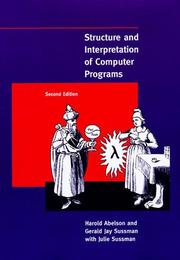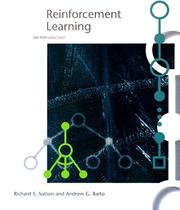| Listing 1 - 10 of 110 | << page >> |
Sort by
|
Book
ISBN: 9067890782 Year: 1987 Publisher: Amsterdam : Addison-Wesley,
Abstract | Keywords | Export | Availability | Bookmark
 Loading...
Loading...Choose an application
- Reference Manager
- EndNote
- RefWorks (Direct export to RefWorks)
681.3*A1 --- 681.3*D20 --- Introductory and survey --- Computerwetenschap--?*D20 --- 681.3*A1 Introductory and survey --- Computerwetenschap--?*D20.
Book
ISBN: 9062331270 Year: 1985 Publisher: Den Haag Academic service
Abstract | Keywords | Export | Availability | Bookmark
 Loading...
Loading...Choose an application
- Reference Manager
- EndNote
- RefWorks (Direct export to RefWorks)
Computer architecture. Operating systems --- 681.3 --- 681.3*D23 --- Computerwetenschap --- Coding: pretty printers; program editors; reentrant code; standards (Softwareengineering) --- Business --- Computer programs. --- 681.3*D23 Coding: pretty printers; program editors; reentrant code; standards (Softwareengineering) --- 681.3* / / / / / / / / / / / / / / / / / / / / / / / / / / / /
Book
ISBN: 907203709X Year: 1994 Publisher: 's-Gravenhage Vogin
Abstract | Keywords | Export | Availability | Bookmark
 Loading...
Loading...Choose an application
- Reference Manager
- EndNote
- RefWorks (Direct export to RefWorks)
Programming --- Library automation --- 025:681.3 --- Bibliotheken 02 --- Bibliotheekautomatisering --- 025:681.3 Bibliotheekautomatisering --- Libraries --- Automation --- Library science --- Software
Book
ISBN: 9014020309 Year: 1972 Publisher: Alphen aan den Rijn Samsom
Abstract | Keywords | Export | Availability | Bookmark
 Loading...
Loading...Choose an application
- Reference Manager
- EndNote
- RefWorks (Direct export to RefWorks)
681.3*A1 --- 681.3*K2 --- 681.3*K4 --- 681.3*K40 --- Introductory and survey --- History of computing: hardware; people; software; systems; theory --- Computerwetenschap--?*K4 --- Computerwetenschap--?*K40 --- 681.3*K2 History of computing: hardware; people; software; systems; theory --- 681.3*A1 Introductory and survey

ISBN: 0262011530 0262510871 9780262011532 0070004846 9780070004849 9780262510875 Year: 2002 Publisher: Cambridge (Mass.) MIT Press
Abstract | Keywords | Export | Availability | Bookmark
 Loading...
Loading...Choose an application
- Reference Manager
- EndNote
- RefWorks (Direct export to RefWorks)
Programming --- Computer programming --- LISP (Computer program language) --- Computer programming. --- Programmation (Informatique) --- LISP (Langage de programmation) --- Electronic digital computers --- 681.3*D2 --- 681.3*D3 --- 681.3*I2 --- 681.3*I2 Artificial intelligence. AI --- Artificial intelligence. AI --- 681.3*D3 Programming languages --- Programming languages --- 681.3*D2 Software engineering: protection mechanisms; standards--See also {681.3*K63}; {681.3*K51} --- Software engineering: protection mechanisms; standards--See also {681.3*K63}; {681.3*K51} --- Electronic digital computers programming --- Electronic digital computers. Programming --- Common lisp (computer program language)
Book
ISBN: 9062331696 Year: 1985 Publisher: Den Haag : Academic service,
Abstract | Keywords | Export | Availability | Bookmark
 Loading...
Loading...Choose an application
- Reference Manager
- EndNote
- RefWorks (Direct export to RefWorks)
Programming --- systeemontwikkeling (informatica) --- informatieanalyse --- Information systems --- NIAM --- 681.3 --- 681.3*H10 --- 681.3*E4 --- 681.3 "2000" --- 681.3*H21 --- 681.3*H32 --- 681.35 --- 681.37 --- 681.33 --- 681.3*H32 Information storage: file organization; record classification --- Information storage: file organization; record classification --- 681.3*H21 Logical design: data models; normal forms; schema and subschema (Database management) --- Logical design: data models; normal forms; schema and subschema (Database management) --- 681.3*E4 Coding and information theory: data compaction and compression; formal modelsof communication; nonsecret encoding schemes--See also {681.3*H11} --- Coding and information theory: data compaction and compression; formal modelsof communication; nonsecret encoding schemes--See also {681.3*H11} --- Computer science --- Computerwetenschap--?*H10 --- Computer science--?"2000" --- Computer. Informatica. Automatisering --- Computerarchitectuur. Operating systems --- Informatiesystemen --- Programmering --- informatica --- constructie (informatica) --- Computer architecture. Operating systems --- 681.3* / / / / / / / / / / / / / / / / / / / / / / / / / / / / --- Informatica. --- Informatie. --- Informatiesystemen. --- NIAM. --- Ontwerpen.

ISBN: 0333778790 Year: 2000 Publisher: London Nature Publ. Group
Abstract | Keywords | Export | Availability | Bookmark
 Loading...
Loading...Choose an application
- Reference Manager
- EndNote
- RefWorks (Direct export to RefWorks)
Computer. Automation --- Computer science --- Informatique --- Encyclopedias --- Encyclopédies --- 681.3 <03> --- #ECO:04.09:sectoren IT-technologie ICT internet --- 681.3*A0 --- Informatics --- Science --- Computerwetenschap--Naslagwerken. Referentiewerken --- General --- 681.3*A0 General --- Encyclopédies --- Encyclopedias.
Periodical
ISSN: 07786530 Year: 1990 Publisher: Vilvoorde Brussel VNU business publications. APT Data Services.
Abstract | Keywords | Export | Availability | Bookmark
 Loading...
Loading...Choose an application
- Reference Manager
- EndNote
- RefWorks (Direct export to RefWorks)
informatica --- Computer. Automation --- Computers --- Ordinateurs --- Périodiques --- Tijdschriften --- 05 <493> --- 681.3 --- #ETEW:TSCAT --- Closed periodicals --- 096 Informatica --- tijdschriften --- Informatica (computers) --- Tijdschriften. Periodieken. Serials--België --- Computerwetenschap --- Computer science --- Periodicals --- #A9504A --- #ANTI95 --- 05 <493> Tijdschriften. Periodieken. Serials--België --- 681.3* / / / / / / / / / / / / / / / / / / / / / / / / / / / / --- 681.3*

ISBN: 0262193981 9780262193986 9780262257053 026225705X 1282096788 9786612096785 0585024456 0262303841 Year: 1998 Publisher: Cambridge MIT press
Abstract | Keywords | Export | Availability | Bookmark
 Loading...
Loading...Choose an application
- Reference Manager
- EndNote
- RefWorks (Direct export to RefWorks)
Reinforcement learning, one of the most active research areas in artificial intelligence, is a computational approach to learning whereby an agent tries to maximize the total amount of reward it receives when interacting with a complex, uncertain environment. In Reinforcement Learning, Richard Sutton and Andrew Barto provide a clear and simple account of the key ideas and algorithms of reinforcement learning. Their discussion ranges from the history of the field's intellectual foundations to the most recent developments and applications. The only necessary mathematical background is familiarity with elementary concepts of probability.The book is divided into three parts. Part I defines the reinforcement learning problem in terms of Markov decision processes. Part II provides basic solution methods: dynamic programming, Monte Carlo methods, and temporal-difference learning. Part III presents a unified view of the solution methods and incorporates artificial neural networks, eligibility traces, and planning; the two final chapters present case studies and consider the future of reinforcement learning.
Reinforcement learning. --- Reinforcement learning (Machine learning) --- Machine learning. --- Reinforcement learning --- 681.3*I26 --- 681.3*I2 --- 681.3*I2 Artificial intelligence. AI --- Artificial intelligence. AI --- 681.3*I26 Learning: analogies; concept learning; induction; knowledge acquisition; language acquisition; parameter learning (Artificial intelligence)--See also {681.3*K32} --- Learning: analogies; concept learning; induction; knowledge acquisition; language acquisition; parameter learning (Artificial intelligence)--See also {681.3*K32} --- Machine learning --- Reinforcement (Psychology) --- Learning classifier systems --- Apprentissage par renforcement (Intelligence artificielle) --- Learning, Machine --- Artificial intelligence --- Machine theory --- Monograph

ISBN: 0136378439 9780136378433 Year: 1973 Publisher: Englewood Cliffs (N.J.): Prentice Hall
Abstract | Keywords | Export | Availability | Bookmark
 Loading...
Loading...Choose an application
- Reference Manager
- EndNote
- RefWorks (Direct export to RefWorks)
Computer programming management --- -operating systems --- Programming management (Electronic computers) --- Computer programming --- Operating systems (Computers) --- operating systems --- 519.68 --- 681.3*D40 --- 681.3*D4 --- 681.3*D40 Operating systems: general --- Operating systems: general --- Computer operating systems --- Computers --- Disk operating systems --- Systems software --- 519.68 Computer programming --- 681.3*D4 Operating systems--See also {681.3*C} --- Operating systems--See also {681.3*C} --- Management --- Operating systems --- Computer architecture. Operating systems --- Operating systems (Computers). --- Management. --- Langages de programmation --- Computer programming - Management
| Listing 1 - 10 of 110 | << page >> |
Sort by
|

 Search
Search Feedback
Feedback About
About Help
Help News
News